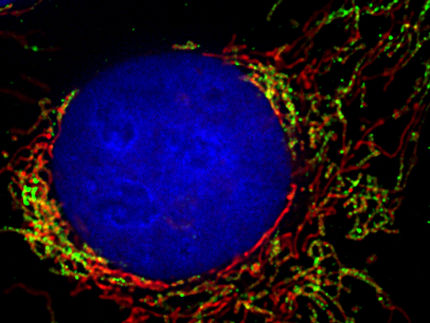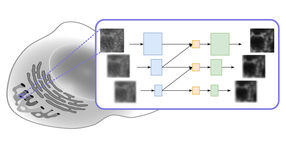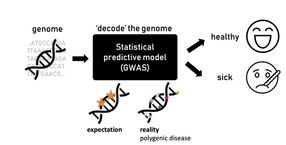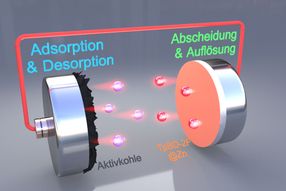Hot on the trail of cellular metabolism
Researchers unravel the function of cell proteins
Cells have a metabolism that can be altered according to its function and requirements. If cellular metabolism is disturbed, it can lead to disease of the entire organism. Researchers at the University of Veterinary Medicine, Vienna discovered that the uncoupling proteins UCP2 and UPC4 are involved in different types of cellular metabolism. The proteins provide information about the condition of cells. As a result, cell alterations can now be detected much earlier than was thus far possible. This research work was published in the PLOS ONE journal.
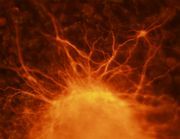
An embryonic stem cell differentiating into a neuronal cell under the microscope.
Anne Rupprecht/Vetmeduni Vienna
UCPs or uncoupling proteins are present in mitochondria, the powerhouse of each cell in the body. The functions of most of the five known UCPs remain mysterious (UCP2-UCP5), whereby only the distinct function for UCP1 has thus far been discovered. UCP1 is responsible for heat production when muscle activity is deficient such as is the case with babies and animals in hibernation. The research team at the Department of Physiology and Biophysics at the University of Veterinary Medicine in Vienna were able to provide a fundamental explanatory concept for the function of UCP2 and UPC4 for the first time. Each of these proteins are involved in different types of cell metabolism.
UCP2 in stem cells and cancer cells
In earlier studies of immune cells, lead author, Anne Rupprecht, had already shown that UCP2 could be involved in increased metabolism. Embryonic stem cells precisely exhibit such an increased metabolism, as they rapidly and continually divide, just like cancer cells. Rupprecht searched for various UCPs in embryonic stem cells of mice and in effect found UCP2. “Very high amounts of UCP2 even indicated an especially strong increase in metabolism. In other studies UCP2 had also already been detected in cancer cells”, according to Rupprecht.
UCP4 in nerve cells
In contrast to UCP2, UCP4 is only found in nerve cells. Nerve cells have a completely different metabolism. They seldom divide, unlike stem cells and cancer cells. The research team of Prof. Elena Pohl therefore examines embryonic stem cells that differentiated to nerve cells in culture. On the basis of this model system, the researchers could show that UCP2 is still existent in the quickly reproducing stem cells, yet at the moment of differentiation are replaced by UPC4.
“In our work, we have examined the natural process of cell differentiation from stem cells to neurons. We know that metabolism changes during differentiation. The fact that we found UCP2 in one case and in the other UCP4 proves for the first time that these proteins are associated with varying types of cell metabolism”, specified Elena Pohl.
The researchers, for example, found only UCP2 in neuroblastoma cells - nerve cells that have malignant changes. UCP4, the usual protein of nerve cells was not detectable. UPC4 apparently got lost in the changed nerve cells that were on their way to becoming rapidly reproductive cancer cells.
UCPs for early detection of disease
Rupprecht describes the relevance of her work like this: “The composition of UCPs in the cells discloses information about their current condition. UCP2 could therefore give an indication at an early stage, if a cell is on the way to becoming a cancer cell. Even a classification of the tumor’s malignancy would eventually be possible. A faulty mechanism in the nerve cells could lead to a functional disorder and, for instance, to a neurodegenerative illness like Parkison’s disease.“
